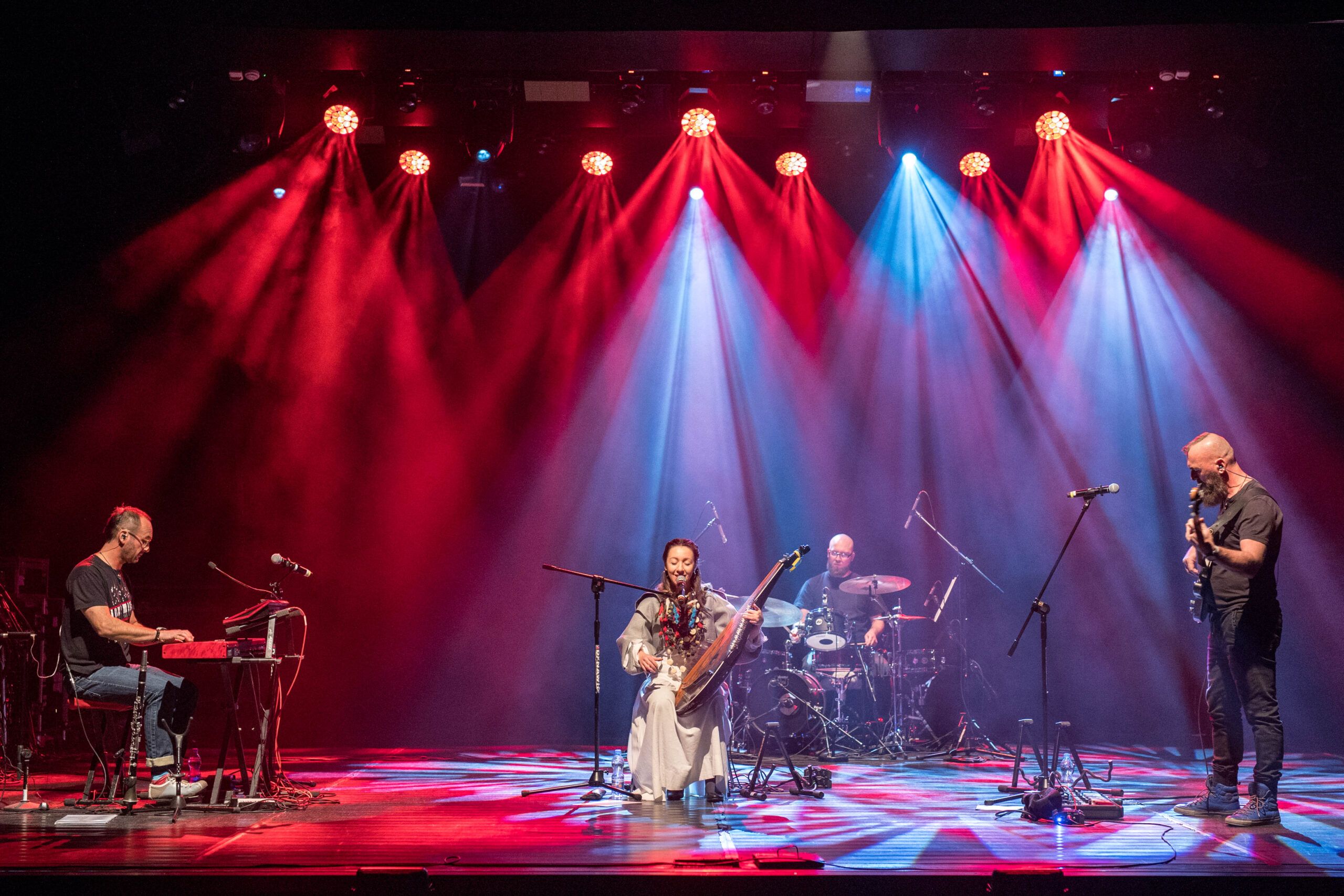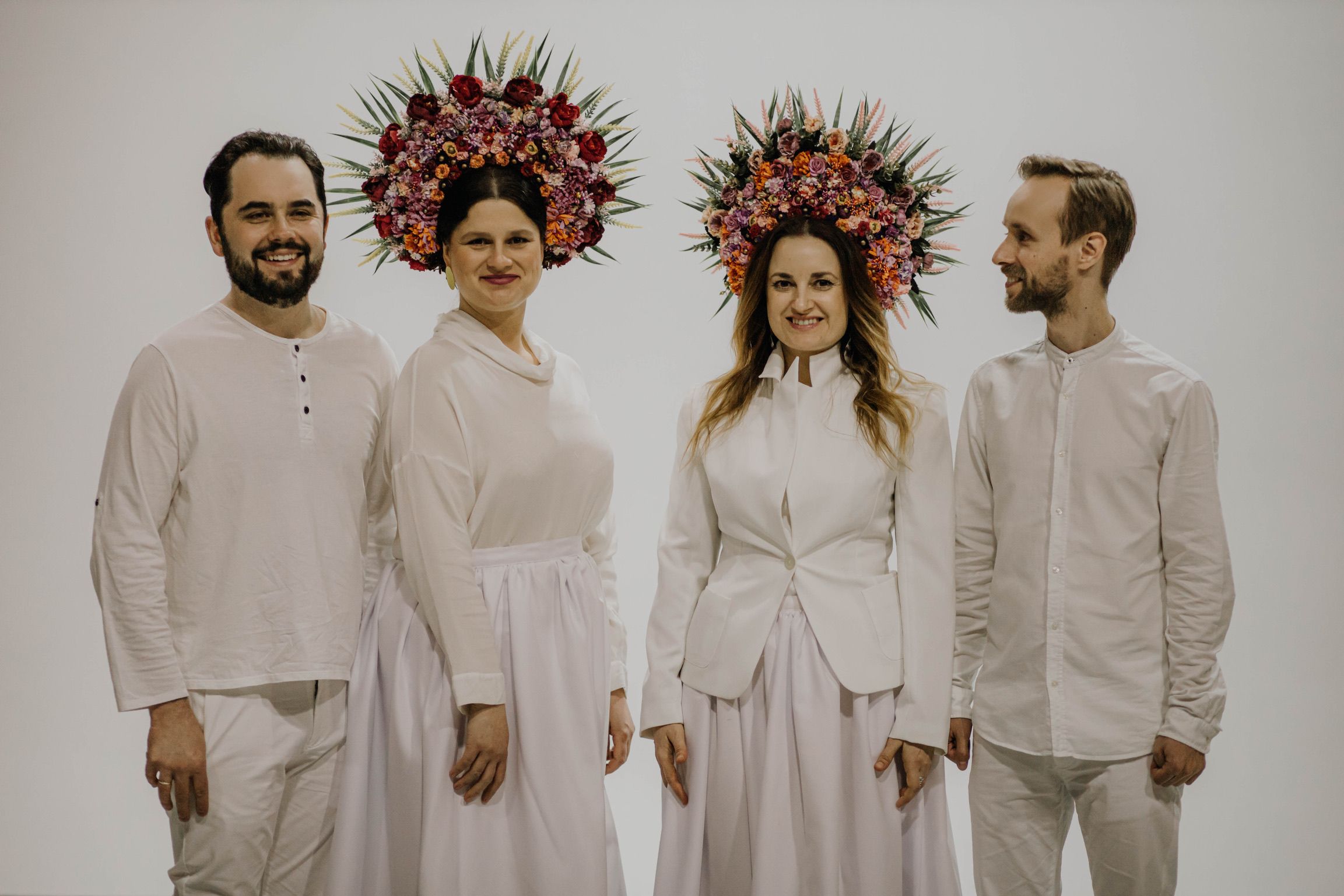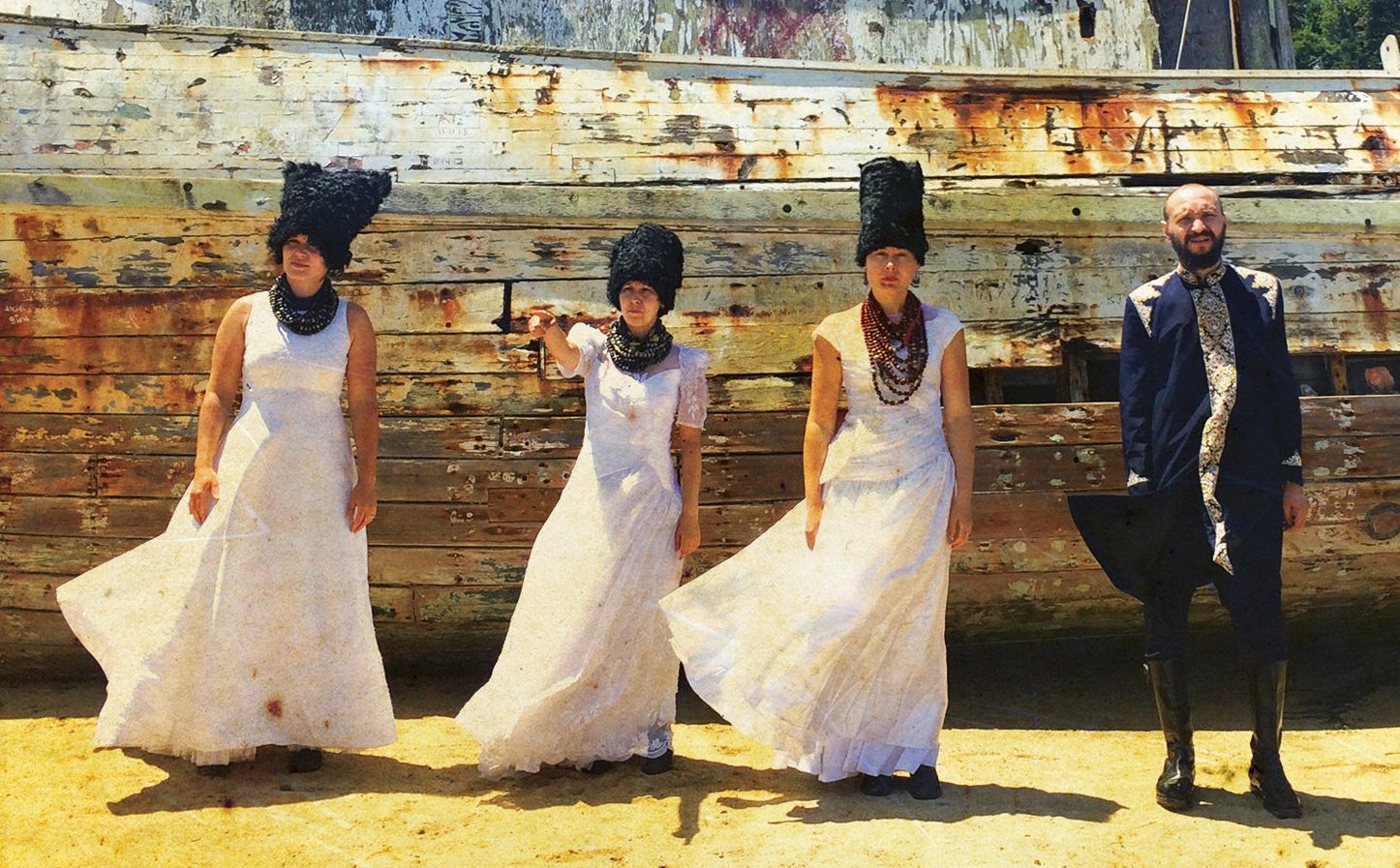In the middle of December, a colleague from Poland called me and offered me the opportunity to play a concert on February 24, 2023, to commemorate the anniversary of Ukraine’s resistance to the Russian attack. At that moment, I began to realize that this terrible war, which actually began nine years ago, had already then been going on for almost a year.
Text: Anastasiya Voytyuk
[Editor’s note: The following text is a commentary that reflects the opinion of a directly affected person from Ukraine. It does not in all respects reflect the opinion of a Western and only indirectly affected editorial staff at folker’s.]
Since April 2022, like many Ukrainian musicians, I am actively performing mainly in Poland and abroad. These are opportunities to raise funds to help Ukraine and to work. They are a good way to communicate with the world. After a whole year, the news about the war in Ukraine often have kind of faded into the background. On the one hand, this is natural, because people cannot constantly be in a state of turmoil and hear only about the war. But on the other, the war is still going on, and in order to win, we must not forget about it. An observation that makes us musicians realize and shape our values: We understand that we should be voices for Ukraine and an anti-russian, anti-imperialist message in the world.
In addition to the fact that the musical community of Ukraine first of all consists of just normal people with emotions, fears and hopes, we feel that there is an important role we play in the war: It is to observe, experience, record, tell and also to give hope, share necessary and important emotions in times of war with the people in Ukraine but also abroad. That was my actual motivation when, in mid-April 2022, I agreed to leave volunteering at a shelter for displaced people in Lviv and go on a charity tour of Polish cities with my own band Troye Zillia together with DagaDana. I very clearly felt the connection between victory and the development of culture – in the case of Ukraine, these are closely related things.
Troye Zillia
Photo: Tarnowskie Góry
It is very painful to admit that it was the war that served as catalyst for great changes in Ukrainian music. Although Ukrainian folk music in its retrospective view of the country’s history has always been far from russian* narratives, it used to be much less popular than it is now. We have experienced aggression from our eastern neighbour for a long time and already in our older history, and our ancestors before have sung about all this in songs. The same cannot be said about other areas, especially popular music, which until 2014 was still quite strongly connected with the russian market, and after 2014 not all musicians of popular genres decided to break ties with the aggressor. But after February 24, it became clear that keeping up relations with the russian market amounts to supporting the war, as its finances also support russian aggression. That is why many musicians have made radical changes in their work in favour of Ukrainian content. At the same time, we began to see more clearly the huge difference in our worldview as compared to the way russians look upon the world. While in order to win we are ready to fight, change and let go, russians often react passively to reality and say that they are just small people who cannot change big politics.
DagaDana
Photo: P. D. Kosmowska
One of the biggest changes in the Ukrainian music market is to be seen in a change in attitude towards the Ukrainian language. It has gained the status of a noble, desirable, in some healthy sense even fashionable way to communicate, while russian, despite the fact that it is still spoken by many Ukrainians, is considered now as something dirty and undesirable – in the public space as well as in music. Artists that don’t switch to the Ukrainian language can more or less say goodbye to the domestic music market. I remember how at the beginning of the war, in mid-March 2022, I received a phone call with an offer to record a piece on the bandura for a well-known artist who previously had sung both in russian and Ukrainian. The track was entirely in Ukrainian, interspersed with a large number of Ukrainian folk instruments like bandura, flute or trembita. Today this singer only works with lyrics in Ukrainian. This can definitely be considered a victory as far as the Ukrainian music market is concerned.
The change in Ukrainian music is also strongly influenced by the change in demand from listeners. A recent study conducted by colleagues from the Ukrainian Open Source Intelligence (OSINT) community Molfar had a look at how the musical tastes of Ukrainians have changed since the beginning of 2022 by analysing the Top 100 on each of the popular music platforms. The most content of Ukrainian origin they found on YouTube Music with a percentage of 76, followed by Deezer with 61 percent. Shazam and Spotify had only 38 percent each. At the same time, the Spotify charts still had a lot of russian content with a percentage of 48, Apple Music had 27 and Shazam coming third with 13. The following video shows how the musical tastes of Ukrainians on Youtube Music (the most popular music platform in Ukraine at the moment) changed from the beginning of 2022 until August of that year: www.youtube.com/watch?v=J-CT-yCVVHk&ab_channel=Tomako. While the top ten most popular tracks at the beginning of 2022 were still almost all of russian origin, there occurred a complete “Ukrainiasation” with the progress of the war. More about the research results can be found here: www.molfar.global/blog/song-charts.
“Artists that don’t switch to the Ukrainian language can more or less say goodbye to the domestic music market.”
Perhaps it seems strange to residents of Germany or Poland that the situation of the Ukrainian language is such a difficult one. Indeed, a lot of people in Ukraine communicate in russian, and there is a very logical explanation for this: During the last 400 years, Ukrainian language and culture were banned dozens of times, while Ukrainians who tried to resist this were persecuted and often killed. And now russia is pursuing the same policy in the occupied territories, banning everything Ukrainian including music. (On the problem of the suppression of the Ukrainian language, see also here: https://en.wikipedia.org/wiki/Chronology_of_Ukrainian_language_suppression.)
As mentioned above, traditional music has begun to gain popularity, because it is a component of Ukrainian identity, which is now very important in order to understand what we are fighting for. For me, as a musician who works with folk music, it is exciting to see how quickly many musicians in Ukraine have become interested in traditional music. One of my friends even joked recently about the Ukrainian national selection for last year’s Eurovision Song Contest: “I heard that some pop group won at this folktronica festival?” Yes, there are a lot of references to ethnic motifs in popular music at the moment. Where a year or two ago musical elements like pipe, bandura or ethnic vocals were to be heard from groups like Dakha Brakha, Onuka, Go_A and several dozen lesser-known niche folk bands, now almost all artists have folk motifs in at least one of their songs. It has become a kind of visiting card for Ukrainians.
Having a closer look at the creative output of musicians since the beginning of the war, many domestic artists create new songs that can be generally categorized as war songs. They are intended to raise spirits, make fun of the enemy, and often these songs are humorous and give an opportunity to take a breath, immerse oneself in other emotions. They have taken on the nature of musical memes, which are now very popular in Ukraine. For example, the song “Bayraktar”, which addresses the subject of the Turkish drone used by the Ukrainian army. At the very beginning of the war, there were many soulful songs about home, friendship and love when we Ukrainians realized what we had to lose and began to appreciate these things more.
It is obvious that musicians taking a clear stance is very important for all Ukrainians at the moment. It will not work to remain silent, because artists are expected to actively express themselves in the war against russia. At the same time, it is difficult for the people of Ukraine to accept any past contacts with the country of the aggressor after the start of the war in 2014 such as former collaborations with russian artists or labels as well as playing concerts in russia. Many musicians had to face difficult questions in that respect and sincerely tried to explain that they were wrong – not the most pleasant, but definitely the right direction at the moment.
Dakha Brakha
In February 2022, Ukrainian musicians found themselves in a situation where they had to make a quick and difficult choice. Many artists, mostly men, but also women, are now at the front line, some even already since 2014. Among my friends, for example, there is the leader of folk band Koralli, Mykhailo Adamchak, who works as a military medic in the famous medical battalion Hospitaliers; there is also the talented jazz bass player Andriy Kokhan; there is the drummer of my band Troye Zillia, Sergiy Krasutski; and also Andriy Zholob, member of punk band Beton, who also is a military medic and maintains a blog on Facebook. And there are many, many others.
Most musicians are engaged in volunteer activities, involving their fan base and making use of their connections to raise funds helping the Ukrainian military and war victims. Currently, crowdfunding in Ukraine is taking place at a tremendous pace and we are collecting literally millions every day. Many musicians play charity concerts, the profits of which are either partly or in total donated to charity.
At the same time, there is a clear difference between what female musicians can do in relation to their male colleagues. Since the imposition of martial law in February 2022, men are not allowed to leave Ukraine without special permission. One of the opportunities for male musicians to temporarily travel abroad is the participation in charity concerts to raise funds for Ukraine. To obtain such a permit, it is necessary to submit a request to the Ministry of Culture of Ukraine. Fortunately, this mechanism works well enough. Although I also came upon male musicians taking the stance that in times of war, it is better for female musicians to perform abroad, and for men to work in Ukraine. It is still a fact that many active Ukrainian musicians are currently working out of the country. Some say, it is even a percentage of 30, which seems hard to believe. Its exact number is difficult to measure at the moment, but they are indeed a lot.
Onuka
One of the most unpleasant things Ukrainian musicians abroad have to face is the problem of crossing paths with russian artists on international stages. For every conscientious Ukrainian, the issue of any kind of collaboration with anyone from russia is definitely not desirable, and here in Ukraine this rule works without discussion. However, not all organizers of musical events in the world make it their priority to refuse to cooperate with russian artists. Yes, many do support Ukraine, but either because of pacifist beliefs or from economic points of view, they often do not refrain from cooperations with russian artists. The Hungarian Sziget festival, for example, did not refuse russian artists to participate despite an appeal of Ukrainian musicians who were also invited to the festival. (Details about this can be found here: www.slukh.media/en/texts/ukrainian-sziget-2022.)
Among the inspiring international news are the collaborations of Ukrainian musicians with world stars, of course, first of all Pink Floyd, who together with Andriy Khlyvniuk of Boombox released their own version “Hey, Hey, Rise Up” of Khlyvniuk’s cover of the Ukrainian folk song “Oy U Luzi Chervona Kalyna“. Or the victory of Kalush Orchestra at the ESC 2022. It is clear that large parts of the world are essentially interested in supporting Ukraine. Something that also applies to music, and thanks to this, Ukrainians have a good chance to become more present on the music scenes of various genres in Europe and the world. Our hope is that this interest and desire for cooperation will turn into a stable process and help Ukrainian music to move forward.
Koralli
I am writing this article sitting in Lviv, while experiencing daily blackouts because russia is destroying our electricity system with its missiles. Last month, I heard two missiles and was without electricity for a whole day. People in the eastern regions and even in Kyiv hear missiles much more often. And despite all this, we have learned how to live and work on in such conditions. I plan my work at the computer or in the studio at times where there is electricity, and when there is none, I plan meetings, move around the city, give vocal lessons. Everything is possible, if we want it. Ukrainians are very optimistic and hardworking, and the whole civilized world is helping us. That’s why we will win.
* As a Ukrainian, the author deliberately uses lower case in her article to write the country name “russia” or related terms. On the one hand she does this to express her attitude as a Ukrainian towards “russian” aggression, on the other hand, it is currently a common feature of Ukrainian media to write anything “russian” in lower case. Since this is a personal statement, we, the editors, have decided to leave the spelling as handed in by the author.
Anastasiya Voytyuk is a singer and plays the Ukrainian national instrument bandura (combines elements of zither and lute). She mainly works in the field of Ukrainian folk music and is leader of the folk fusion band Troye Zillia. With the Lviv Bandur Fest she created the first modern bandura festival in Ukraine. She was involved in the development of the Bandura App, which allows its users to play six Ukrainian musical instruments, and leads the non-governmental organization Unbeaten Path, which works with projects in the fields of culture, education and integration.
www.facebook.com/lvivbandurfest
Musicians Defend Ukraine Foundation: www.shpytal.com/musicians-defend-ukraine
Videolinks:
Kalush Orchestra, „Stefania“: www.youtube.com/watch?v=Z8Z51no1TD0&ab
Im Weihnachtsprojekt „Carols on Kudryavka“ singen bekannte Künstlerinnen und Künstler zusammen mit dem traditionellen Folkensemble Schuka-Ryba: www.youtube.com/watch?v=TBJO9H3-pr8&ab_channel=MEGOGOLIVE
Mykhailo Adamchak spielt Flöte im Schützengraben, April 2022: www.facebook.com/myshko.adamchak/videos/364826258923955
CNN-Video über die Band BETON aus Lwiw: www.facebook.com/betonpunknroll/videos/607880604674550kalush
Pink Floyd feat. Andriy Khlyvnyuk, „Hey, Hey, Rise Up“: www.youtube.com/watch?v=saEpkcVi1d4
Anastasiya Voytyuk











0 Kommentare